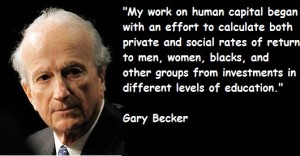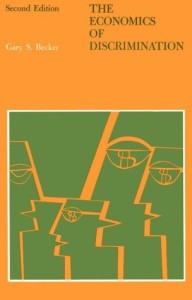 “Economy is the art of making the most of life,” Gary Becker said. This Big Thinker in economics has died, and he helped shape how economists – and specifically health economists – view the world.
“Economy is the art of making the most of life,” Gary Becker said. This Big Thinker in economics has died, and he helped shape how economists – and specifically health economists – view the world.
Gary Becker was an economist who lived and thought about the real world: how we earn money, how we learn, how we live, and how our local environment impacts us.
He taught at the University of Chicago, but lectured around the world. I was fortunate enough to meet him, twice, and attend his talks.
While as an economist, he was masterful with numbers, he complemented his economic modeling with social stories and values – considering peoples’ attitudes and feelings, social structures and cultures. He wrote about gun control, school vouchers, fertility, the market for human organs, early childhood education, women and fair pay.
 His book, The Economics of Discrimination, the basis of Dr. Becker’s Ph.D. thesis, was published in 1957, and was a textbook for civil rights leaders and scholars. Dr. Becker talked about his approach in the book in an interview: “So I had this little idea. I saw a way of taking the prejudices of workers and employers and customers and all groups, even governments, and sort of putting that through an economic analysis with competition and the goals of employers, opportunities for black and white employees to choose among different firms. So it becomes a complicated problem, using all the tools of economics.”
His book, The Economics of Discrimination, the basis of Dr. Becker’s Ph.D. thesis, was published in 1957, and was a textbook for civil rights leaders and scholars. Dr. Becker talked about his approach in the book in an interview: “So I had this little idea. I saw a way of taking the prejudices of workers and employers and customers and all groups, even governments, and sort of putting that through an economic analysis with competition and the goals of employers, opportunities for black and white employees to choose among different firms. So it becomes a complicated problem, using all the tools of economics.”
He received the Nobel Prize in 1992.
Health Populi’s Hot Points: Gary Becker’s work on economics of the family, economics of women, economics of the household, and health economics had a huge impact on my thinking as a young economics student at the University of Michigan in the 1980s. He taught me that investing in the individual — woman, man, and most especially child — has ripple effects on the larger economy beyond the home. Investing in human capital meant investing in health, ultimately.
Becker showed that human capital investment first begins at home, and should begin as early as possible – even before birth, when we consider the impact of pre-natal care and health in the home, health in the family, and in neighborhood environments.
I will continue to carry Gary Becker’s legacy through my work in health and health care. RIP, dear teacher.
And remember: Economy is the art of making the most of life.




 Interviewed live on BNN Bloomberg (Canada) on the market for GLP-1 drugs for weight loss and their impact on both the health care system and consumer goods and services -- notably, food, nutrition, retail health, gyms, and other sectors.
Interviewed live on BNN Bloomberg (Canada) on the market for GLP-1 drugs for weight loss and their impact on both the health care system and consumer goods and services -- notably, food, nutrition, retail health, gyms, and other sectors. Thank you, Feedspot, for
Thank you, Feedspot, for  As you may know, I have been splitting work- and living-time between the U.S. and the E.U., most recently living in and working from Brussels. In the month of September 2024, I'll be splitting time between London and other parts of the U.K., and Italy where I'll be working with clients on consumer health, self-care and home care focused on food-as-medicine, digital health, business and scenario planning for the future...
As you may know, I have been splitting work- and living-time between the U.S. and the E.U., most recently living in and working from Brussels. In the month of September 2024, I'll be splitting time between London and other parts of the U.K., and Italy where I'll be working with clients on consumer health, self-care and home care focused on food-as-medicine, digital health, business and scenario planning for the future...